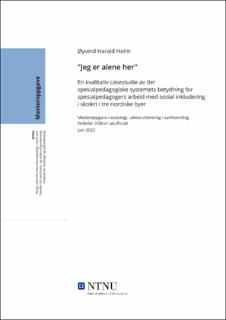| dc.contributor.advisor | Leiulfsrud, Håkon | |
| dc.contributor.author | Holm, Øyvind Harald | |
| dc.date.accessioned | 2022-08-30T17:19:51Z | |
| dc.date.available | 2022-08-30T17:19:51Z | |
| dc.date.issued | 2022 | |
| dc.identifier | no.ntnu:inspera:104661660:17114845 | |
| dc.identifier.uri | https://hdl.handle.net/11250/3014548 | |
| dc.description.abstract | Denne masteroppgaven undersøker hvilke føringer det spesialpedagogiske systemet legger for spesialpedagogers handlingsrom for å arbeide med sosial inkludering i skolen. Oppgaven benytter seg av en komparativ tilnærming, der de spesialpedagogiske systemene i tre nordiske byer undersøkes, i henholdsvis Norge, Sverige og Finland. I disse byene er til sammen ti spesialpedagoger intervjuet, som legger hovedgrunnlaget for analysen. I tillegg er intervjuer med rektorer og kommunalt ansatte i de tre nordiske byene benyttet, som sammen med styringsdokumenter i hver av byene gir kunnskap om de spesialpedagogiske systemene.
Analysen og diskusjonen i oppgaven baserer seg profesjonssosiologiske perspektiver som beskriver forholdet mellom profesjoner. For å gjøre dette benyttes Abbotts forståelse av forholdet mellom profesjoner, Parkin om sosial lukning som profesjonsstrategi, og Noordegraaf om hybride profesjoner. Analysen viser at spesialpedagogene i de tre nordiske casene har ulik plassering, der de i ulik grad arbeider direkte med sine klienter, i ulik grad arbeider med organisering, og i ulik grad har mulighet til å arbeide henholdsvis individrettet og systemrettet med inkludering.
De spesialpedagogiske systemene har innebygde profesjonslogikker, som gir spesialpedagogene i de tre byene ulike profesjonsroller. Resultatet er tre handlingsrom, der mulighetene for å arbeide med sosial inkludering varierer stort. En organisering som legger opp til tydelige profesjonsgrenser er problematisk for spesialpedagogene, fordi det vanskeliggjør samarbeid på tvers av profesjoner, som dagens inkluderingsarbeid i skolen krever. De spesialpedagogiske systemene legger videre i ulik grad opp til arbeid med gråsoneelever. Oppgaven viser at spesialpedagogene kan arbeide med et bredt sett av elever, og fortsatt oppleve legitimitet som profesjon, men at dette fortsatt innebærer noe risiko for profesjonen. Studien konkluderer med at de spesialpedagogiske systemene må balansere mange hensyn, som selvstendighet eller samarbeid, og tydelig jurisdiksjon eller hybrid jurisdiksjon. I tillegg påvirkes handlingsrommet til spesialpedagogene av hvilken skole man arbeider på, der den sosioøkonomiske statusen til skolen gir ulike utfordringer og muligheter. Likevel vil de spesialpedagogiske systemene som legger opp til samarbeid og hybriditet gi spesialpedagogene det største potensielle handlingsrommet for å arbeide med sosial inkludering. | |
| dc.description.abstract | This master thesis aims to examine the guidelines the special education system poses for special educators’ room for action to work with social inclusion in school. This thesis uses a comparative approach, in which the special education systems in three Nordic cities, in Norway, Sweden and Finland, are being examined. In these cities, a total of 10 special educators were interviewed, and the analysis will be based on these interviews. In addition, interviews with principals and municipal employees in the three Nordic cities are utilized. Together with management documents, these interviews provide knowledge about the special education systems in the three Nordic cities.
Professional sociological perspectives are the theoretical framework that will help shed light on special educators’ room for action in their work. These perspectives include Abbott's understanding of the relationship between professions, Parkin’s perspective on social closure as a profession strategy, and Noordegraaf’s understanding of hybrid professions. Special educators in the three Nordic cases have different placements in the school, this research finds. They work directly with their clients to varying degrees, organize to a different extent, and have varying opportunities to work individually and systemically with inclusion.
The special education systems have built-in professional logics, which gives the special educators in the three cities different professional roles. The result is that special educators’ possibilities to work with social inclusion vary greatly between the cases. An organization that sets clear professional boundaries is problematic for special educators because it makes it difficult to collaborate across professions, which today's inclusion work in the school requires. The special education systems also provide work with a different number of pupils. The study shows how special educators can approach a broad set of pupils, and still experience legitimacy as a profession, even though this includes some risks for the profession. The special education systems must balance many considerations, such as independence or cooperation, and clear jurisdiction or hybrid jurisdiction. In addition, the special educators’ room for action is affected by which school they work at, where the socio-economic status of the school can limit the professionals’ possibilities to work with inclusion. Nevertheless, the special education systems that encourage collaboration and hybridity will give special educators the best potential to work with social inclusion. | |
| dc.language | nob | |
| dc.publisher | NTNU | |
| dc.title | "Jeg er alene her" | |
| dc.type | Master thesis | |
